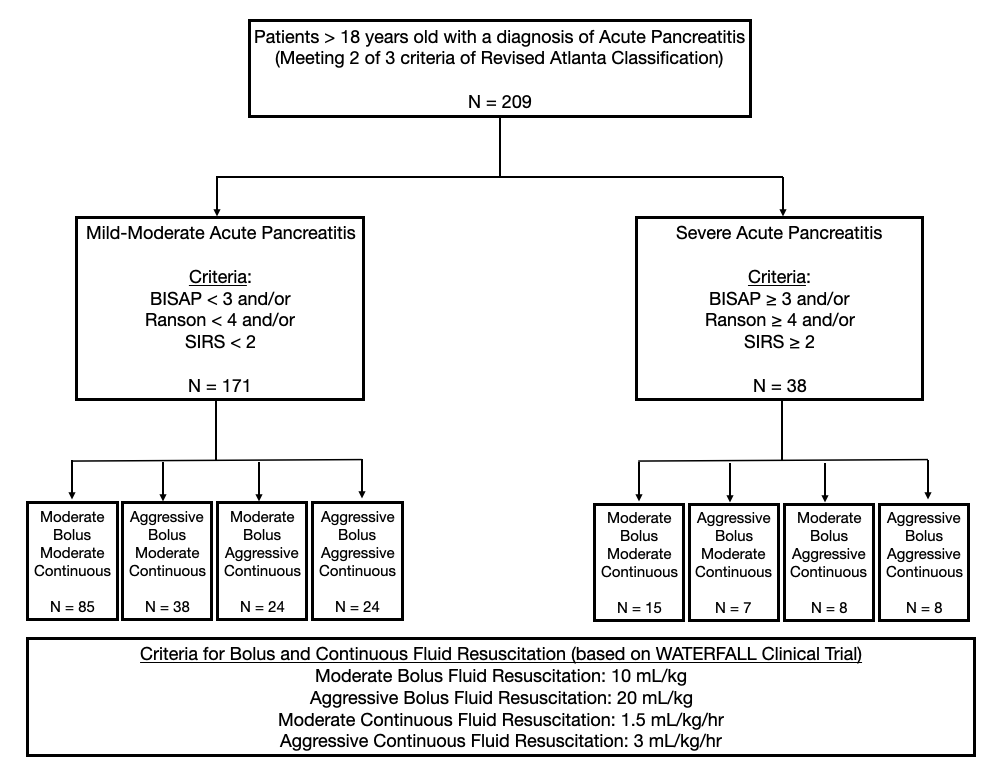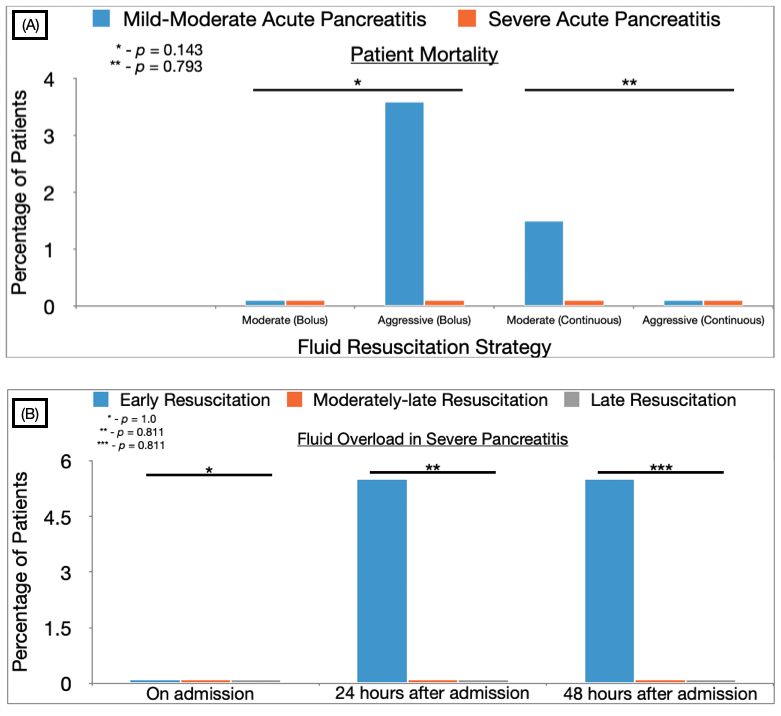Monday Poster Session
Category: Biliary/Pancreas
P2152 - Too Much, Too Soon? Rethinking Fluid Resuscitation in Acute Pancreatitis: A Retrospective Cohort Study
Monday, October 27, 2025
10:30 AM - 4:00 PM PDT
Location: Exhibit Hall

Magnus Chun, MD
Kirk Kerkorian School of Medicine at the University of Nevada Las Vegas
Las Vegas, NV
Presenting Author(s)
Magnus Chun, MD1, Rakhi Patel, DO2, Zan Ferrin, DO2, Sneh Sonaiya, MD, MPH, MBA3, Tahne Vongsavath, DO2, Jiayi Ge, MD1, Kavita Batra, PhD, MPH2, Roberto Sagaribay, PhD2, Vidhani Goel, BS2, Yassin Naga, MD1, Preet Patel, MD2, Jose Aponte-Pieras, MD1
1Kirk Kerkorian School of Medicine at the University of Nevada Las Vegas, Las Vegas, NV; 2Kirk Kerkorian School of Medicine at the University of Nevada, Las Vegas, Las Vegas, NV; 3University of Nevada, Las Vegas, Las Vegas, NV
Introduction: Early fluid resuscitation is the cornerstone of management for acute pancreatitis (AP), yet the optimal volume and approach remain under debate, especially when it comes to differing severities of AP. While early aggressive resuscitation has been standard practice for years, emerging evidence suggests potential harm in certain patient populations. This study explores how the amount and timing of fluid resuscitation can impact clinical outcomes for varying severities of AP.
Methods: A retrospective analysis of patients diagnosed with AP who were admitted to a large academic medical center from January 2023-November 2024 was conducted. Patients were stratified by disease severity (mild-moderate vs. severe) using severity scores and resuscitation strategy (bolus and continuous - moderate vs. aggressive, and timing - early vs. moderately-late vs. late). Univariate and bivariate analyses were conducted using chi-square and one-way ANOVA. Primary outcomes included mortality, hospital length of stay (LOS), and Intensive Care Unit (ICU) admission rate/LOS.
Results: 209 patients were included (mean ± SD age, 46±17 years), with 82% having mild-moderate pancreatitis. Etiologies of AP included gallstone (37.3%), followed by alcohol (22.0%), and hypertriglyceridemia (6.7%). There were no differences in mortality amongst the different severities of AP regardless of fluid resuscitation strategy (bolus, p=0.143, continuous, p=0.793). Post-hoc comparisons in severe AP patients revealed no statistically significant differences in hospital stay (p=0.95) or ICU length of stay (p=0.84) regardless of bolus resuscitation strategy. Similarly, in mild-moderate AP patients, there were no statistically significant differences in hospital LOS (p=1.0) or ICU LOS (p=0.4), regardless of bolus resuscitation strategy. The hospital and ICU LOS were not significantly extended in either the mild-moderate or severe AP patients, regardless of the timing of fluid resuscitation (p>0.05). Fluid overload within 24 and 48 hours of admission were not seen in any severity of AP, regardless of timing of fluid resuscitation or rate (p>0.05).
Discussion: Despite differing fluid resuscitation strategies, there was no optimal fluid resuscitation strategy that led to the improvements in clinical outcomes (mortality, hospital LOS, ICU LOS, fluid overload), regardless of AP severity. Further studies with larger sample sizes are needed to determine an optimal fluid resuscitation strategy based on AP severity.

Figure: Figure 1. Patient Selection Protocol and Criteria Classification

Figure: Figure 2. Despite differing fluid resuscitation strategies, there was no optimal fluid resuscitation strategy that led to the improvements in clinical outcomes (p > 0.05).
Disclosures:
Magnus Chun indicated no relevant financial relationships.
Rakhi Patel indicated no relevant financial relationships.
Zan Ferrin indicated no relevant financial relationships.
Sneh Sonaiya indicated no relevant financial relationships.
Tahne Vongsavath indicated no relevant financial relationships.
Jiayi Ge indicated no relevant financial relationships.
Kavita Batra indicated no relevant financial relationships.
Roberto Sagaribay indicated no relevant financial relationships.
Vidhani Goel indicated no relevant financial relationships.
Yassin Naga indicated no relevant financial relationships.
Preet Patel indicated no relevant financial relationships.
Jose Aponte-Pieras indicated no relevant financial relationships.
Magnus Chun, MD1, Rakhi Patel, DO2, Zan Ferrin, DO2, Sneh Sonaiya, MD, MPH, MBA3, Tahne Vongsavath, DO2, Jiayi Ge, MD1, Kavita Batra, PhD, MPH2, Roberto Sagaribay, PhD2, Vidhani Goel, BS2, Yassin Naga, MD1, Preet Patel, MD2, Jose Aponte-Pieras, MD1. P2152 - Too Much, Too Soon? Rethinking Fluid Resuscitation in Acute Pancreatitis: A Retrospective Cohort Study, ACG 2025 Annual Scientific Meeting Abstracts. Phoenix, AZ: American College of Gastroenterology.
1Kirk Kerkorian School of Medicine at the University of Nevada Las Vegas, Las Vegas, NV; 2Kirk Kerkorian School of Medicine at the University of Nevada, Las Vegas, Las Vegas, NV; 3University of Nevada, Las Vegas, Las Vegas, NV
Introduction: Early fluid resuscitation is the cornerstone of management for acute pancreatitis (AP), yet the optimal volume and approach remain under debate, especially when it comes to differing severities of AP. While early aggressive resuscitation has been standard practice for years, emerging evidence suggests potential harm in certain patient populations. This study explores how the amount and timing of fluid resuscitation can impact clinical outcomes for varying severities of AP.
Methods: A retrospective analysis of patients diagnosed with AP who were admitted to a large academic medical center from January 2023-November 2024 was conducted. Patients were stratified by disease severity (mild-moderate vs. severe) using severity scores and resuscitation strategy (bolus and continuous - moderate vs. aggressive, and timing - early vs. moderately-late vs. late). Univariate and bivariate analyses were conducted using chi-square and one-way ANOVA. Primary outcomes included mortality, hospital length of stay (LOS), and Intensive Care Unit (ICU) admission rate/LOS.
Results: 209 patients were included (mean ± SD age, 46±17 years), with 82% having mild-moderate pancreatitis. Etiologies of AP included gallstone (37.3%), followed by alcohol (22.0%), and hypertriglyceridemia (6.7%). There were no differences in mortality amongst the different severities of AP regardless of fluid resuscitation strategy (bolus, p=0.143, continuous, p=0.793). Post-hoc comparisons in severe AP patients revealed no statistically significant differences in hospital stay (p=0.95) or ICU length of stay (p=0.84) regardless of bolus resuscitation strategy. Similarly, in mild-moderate AP patients, there were no statistically significant differences in hospital LOS (p=1.0) or ICU LOS (p=0.4), regardless of bolus resuscitation strategy. The hospital and ICU LOS were not significantly extended in either the mild-moderate or severe AP patients, regardless of the timing of fluid resuscitation (p>0.05). Fluid overload within 24 and 48 hours of admission were not seen in any severity of AP, regardless of timing of fluid resuscitation or rate (p>0.05).
Discussion: Despite differing fluid resuscitation strategies, there was no optimal fluid resuscitation strategy that led to the improvements in clinical outcomes (mortality, hospital LOS, ICU LOS, fluid overload), regardless of AP severity. Further studies with larger sample sizes are needed to determine an optimal fluid resuscitation strategy based on AP severity.

Figure: Figure 1. Patient Selection Protocol and Criteria Classification

Figure: Figure 2. Despite differing fluid resuscitation strategies, there was no optimal fluid resuscitation strategy that led to the improvements in clinical outcomes (p > 0.05).
Disclosures:
Magnus Chun indicated no relevant financial relationships.
Rakhi Patel indicated no relevant financial relationships.
Zan Ferrin indicated no relevant financial relationships.
Sneh Sonaiya indicated no relevant financial relationships.
Tahne Vongsavath indicated no relevant financial relationships.
Jiayi Ge indicated no relevant financial relationships.
Kavita Batra indicated no relevant financial relationships.
Roberto Sagaribay indicated no relevant financial relationships.
Vidhani Goel indicated no relevant financial relationships.
Yassin Naga indicated no relevant financial relationships.
Preet Patel indicated no relevant financial relationships.
Jose Aponte-Pieras indicated no relevant financial relationships.
Magnus Chun, MD1, Rakhi Patel, DO2, Zan Ferrin, DO2, Sneh Sonaiya, MD, MPH, MBA3, Tahne Vongsavath, DO2, Jiayi Ge, MD1, Kavita Batra, PhD, MPH2, Roberto Sagaribay, PhD2, Vidhani Goel, BS2, Yassin Naga, MD1, Preet Patel, MD2, Jose Aponte-Pieras, MD1. P2152 - Too Much, Too Soon? Rethinking Fluid Resuscitation in Acute Pancreatitis: A Retrospective Cohort Study, ACG 2025 Annual Scientific Meeting Abstracts. Phoenix, AZ: American College of Gastroenterology.
